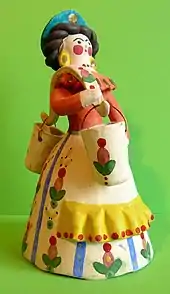Water carrier
Water carrier (also water seller) is a profession that existed before the advent of centralized water supply systems.[1] A water carrier collected water from a source (a river, a well, water pumps, etc.) and transported or carried containers with water to people's homes. After the construction of pipe networks, the profession of water carrier became unnecessary and disappeared.[2]
_(after)_-_Turkish_Men_and_Women%252C_'Derviche_qui_donne_l%E2%80%99eau_par_charit%C3%A9'_-_803040.14.3_-_National_Trust.jpg.webp)

In late Qing dynasty Chengdu, there were over one thousand people who worked as water carriers. They not only performed their official duties, but also helped the elderly and sick who could not take care of themselves with housework. In the 1940s Chengdu water carriers still went barefoot to show that they go deep into the river to collect the purest water.[3]
Between the 16th and 19th centuries in Ottoman Turkey, dervishes called saka or sebilci distributed water for charitable purposes. Among them were dervishes who sympathized with the Mevlevi order.[4]
Gallery
 Tunisia, early 20th century
Tunisia, early 20th century Water carriers on the Ganges, early 20th century
Water carriers on the Ganges, early 20th century Rajasthan in 2006
Rajasthan in 2006 Venice, 19th century
Venice, 19th century Water carrier on the banks of the Nile, early 20th century
Water carrier on the banks of the Nile, early 20th century The Water Carrier, by Eugene de Blaas (1887)
The Water Carrier, by Eugene de Blaas (1887) Statue of a water carrier with a pikolan (yoke), China
Statue of a water carrier with a pikolan (yoke), China El Aguador (The Water Carrier) by Emiliano G. Hernández. Avenida de Juan de Bethencourt and Calle Leon Y Castillo in Puerto del Rosario, Fuerteventura, Canary Islands
El Aguador (The Water Carrier) by Emiliano G. Hernández. Avenida de Juan de Bethencourt and Calle Leon Y Castillo in Puerto del Rosario, Fuerteventura, Canary Islands Le Travail, by Eugene de Blaas (c. 1900)
Le Travail, by Eugene de Blaas (c. 1900) Vodonoska, the Water Carrier. Russian Dymkovo painted figurine in clay
Vodonoska, the Water Carrier. Russian Dymkovo painted figurine in clay A woman selling water at Makola, Ghana
A woman selling water at Makola, Ghana
See also
- Aquarius (astrology)
- Habibullah Kalakani, known as Son of the water carrier.
- Les deux journées, an 1800 opera by Luigi Cherubini also known as The Water Carrier.
References
- Angelakis, Mays & Koutsoyiannis 2012.
- Rakimov 2009.
- Wang 2003.
- Duru, Dr Riza (2023-01-01). "MEVLEVÎ SAKALAR Mevlevi Water-carriers".
{{cite journal}}: Cite journal requires|journal=(help)
Bibliography
- Rakimov, R.R. (2009). Музей антропологии и этнографии им. Петра Великого (Кунсткамера). Центральная Азия: традиция в условиях перемен. Vol. v. 2. Nauka. p. 365. ISBN 9785020252318.
- Angelakis, A.N.; Mays, L.W.; Koutsoyiannis, D. (2012). Evolution of Water Supply Through the Millennia. IWA Publishing. p. 209. ISBN 9781843395409.
- Wang, Di (2003). Street Culture in Chengdu: Public Space, Urban Commoners, and Local Politics, 1870-1930. Stanford University Press. pp. 75–76. ISBN 9780804747783.